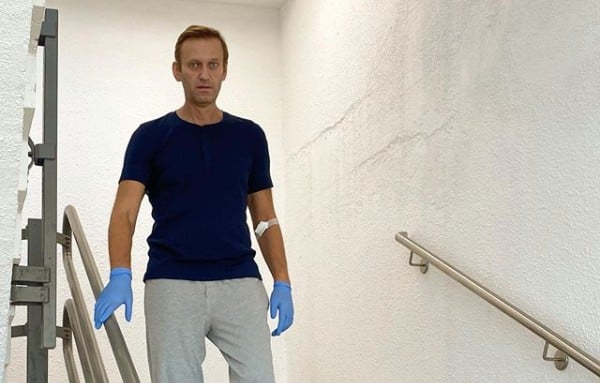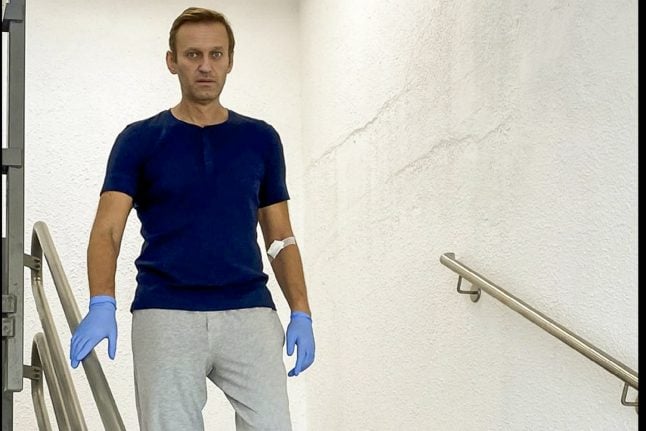POISONING
Russian opposition leader ‘can walk with a tremble’ after Berlin treatment
Russia's leading opposition politician Alexei Navalny announced on Saturday that he could now walk with a "tremble", and gave the first detailed account of his recovery nearly a month after being poisoned.
Published: 19 September 2020 15:09 CEST

Russian opposition leader Alexei Navalny published a photograph of him walking down stairs. Photo: Instagram account of Alexey Navalney
The 44-year-old Kremlin critic posted a photo of himself walking downstairs on Instagram and described how earlier symptoms had included the inability to form words.
“Now I am a guy whose legs tremble when he takes the stairs,” he wrote, detailing moments of “despair” as doctors help him overcome the effects of the nerve agent Novichok.
This latest update on his progress came after posted to Instagram on Tuesday that he had spent a first day breathing unassisted.
The anti-corruption campaigner fell ill on a plane from Siberia to Moscow on August 20 and spent two days in a Russian hospital before being airlifted to Berlin's Charite hospital.
Navalny said in his update that during the initial days of his recovery, he had needed therapy to help him recover his speech as he struggled to form words.
He was still unable to use a phone, he added, meaning friends or family probably posted the messages for him.
Long road to recovery
“Not long ago, I didn't recognise people and couldn't understand how to speak,” he said. “How to find a word and how to make it mean something? This was all totally incomprehensible.
“I didn't know how to express my despair either and so I was just silent.”
The nerve agent Novichok disrupts communication between the brain, the main organs and muscles, while doctors say it gradually clears from the body.
Navalny, who said that he did not remember the early stage of his recovery, thanked the “fantastic doctors” treating him at Charite hospital.
He now saw a “clear path, although not a short one” to recovery, he said.
An avid user of social media, Navalny said that he hoped soon to be “able to scroll through Instagram and add likes without thinking about it”.
Navalny's supporters and some European leaders have said that poisoning with Novichok, a military-grade nerve agent, points to a state-ordered crime.
The revelations of nerve agent use have prompted calls for new sanctions against Russia and for Germany to abandon a near-completed project to carry Russian gas to Europe, Nord Stream 2.
Russia insists its medical tests did not detect any poison in Navalny's body. It says it lacks grounds for a criminal investigation, despite international calls for a transparent probe.
Navalny's aides said that German experts found traces of Novichok on a water bottle in his hotel room in the Siberian city of Tomsk.
Germany announced September 3 that medical tests from a military chemical weapons laboratory had found “unequivocal evidence” of the nerve agent.
Url copied to clipboard!


 Please whitelist us to continue reading.
Please whitelist us to continue reading.
Member comments